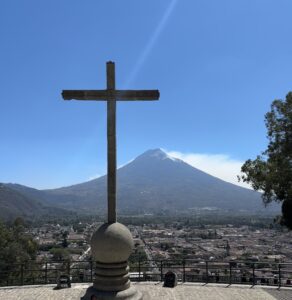by Mary | Feb 24, 2009 | Lent
Ash Wednesday is just hours away. I feel like a kid at Christmas. I know, kind of weird. It’s just who I am, or how I am. I love Lent. Not in some masochistic way, as so many people think, but in a deep, reflective way. There is something so beautiful about spending this time contemplating darkness, sorrow, suffering, and knowing that it ends in light, resurrection, salvation.
That being said, I rarely live up to my Lenten goals and self-imposed challenges. Often I’m floundering around even before the first Sunday of Lent. But every year I give it another try, and maybe without even realizing it, I’m making some kind of progress.
So what am I hoping to do this Lent to make it special? I haven’t nailed it all down yet. I know, I know. Time is running out. I want to get it right and for the right reasons. Noah, who is 12, is giving up meat for Lent. That’s a pretty big deal for a boy who loves hamburgers and chicken nuggets and meat of every kind. He’s a consummate carnivore. But, as he said when I asked about his decision, “It’s supposed to be a real sacrifice, right?” Humbling. I’m trying to think of something that would be my equivalent (since I’ve already given up meat). I am so impressed with Noah’s willingness to pick one of the most difficult choices when he could have taken a much easier way out.
Of course, Lent isn’t just about giving something up. It’s about doing something extra, making spiritual progress of some sort. I’m thinking of trying to pray with the kids during Lent — more than our nightly grace before dinner, which usually ends up rushed or peppered with laughter or yelling or clanking forks or all of the above. Nightly prayer, other than what we do at Chiara’s bedside each night and what the bigger kids do on their own, might be a challenge, but I think it would be worth a shot. We’ll see.
And then there is our Rice Bowl and the accompanying literature, which always offers meatless dinner suggestions from Third World countries. I’ve tried that in the past, but it’s never gone over too well. I think I’ll bypass that for my own Third World-style entrees. Still the stories and the reminders of the abject poverty that so many people live in day after day is a powerful part of the Catholic Relief Services campaign. Now, if we can just remember to regularly put money into the little box so we’re not just writing a check come Holy Week.
I’ll be back tomorrow to continue our Lenten discussion. For now, here’s a link to my Life Lines column from last Lent. Click HERE to read “Lowering My Lenten Expectations.”
by Mary | Feb 20, 2009 | Uncategorized
Here’s a news flash for anyone who’s been living under a rock since, oh, the 1950s: Men view women in bikinis as sexual objects. Believe it or not, CNN has a story on its website today about a Princeton University study that has uncovered the shocking fact that, when shown provocative photos of scantily clad women, men “view sex as a highly desirable goal.” Astonished researchers breathlessly expounded on the findings, touting such important new discoveries as this one: Men remember the bodies of women wearing bikinis better than they remember the bodies of fully clothed women. You can’t make this stuff up. I’m just wondering who commissioned the study. Perhaps a frat house at the Ivy League school?
Shockingly enough, the findings of this ground-breaking study were “consistent with previous work in the field,” which one can only imagine took place at a Mexican resort during spring break. One psychiatrist interviewed about the study went out on a limb by stating: “Many men make foolish choices because of sexual attraction.” Considering the stupidity of that statement, I’ll cut him a break and assume he had a copy of the Sport Illustrated swimsuit issue in front of him when he said it.
If you want to read the full story, which really sounds like something straight from The Onion, click here. If you do and you are a woman, please be forewarned that you may respond by rolling your eyes, sighing heavily, throwing something at the next man you see, or changing the locks on your front door, although I’m not completely sure about that. Maybe I’ll do a study.
by Mary | Feb 19, 2009 | Uncategorized
Last night, over dinner, Dennis and I were telling our pastor how frustrating it is that so many people assume certain things about us because we both work for the Church. They seem to think we listen to nothing but Gregorian chant, we complained. They imagine that we can’t possibly have a good sense of humor because we must spend all our time in prayer or religious reading or something along those lines, we whined. And it is true. People do often make assumptions about who we are and what we like based on what they imagine our professions require or inspire.
No sooner were the words out of our mouths, when Chiara walked into the room holding not one but two Infant of Prague statues brought directly from Prague by her godfather, who is a priest. When I yelled across the room, “Put down the Infant of Prague,” the ridiculousness of the situation hit and suddenly Dennis and I were laughing because I guess in some ways we are kind of churchy (me definitely more so than him). In rapid fire succession, Chiara brought in a Kateri Tekakwitha bracelet that I brought back from the Shrine of the North American Martyrs in Auriesville this fall and a small icon of St. Clare (her namesake) straight from the Basilica di Santa Chiara in Assisi (She has a first-class relic of St. Clare in her bedroom), and a plastic wine glass that she happened to be using as a chalice earlier that afternoon. I swear it was the first time she has ever pretended to play Mass. (There must be something in the Code of Canon Law regarding girls taking on the role of priest in their pretend play.)
Dennis and I sat at the table with our mouths hanging open as Chiara paraded through with one religious item after another, giving considerable heft to the misguided notion that Church people spend too much free time on Church things. Good thing we really do have a sense of humor. Even so I think I’ll put the religious items under lock and key before the next dinner party.
by Mary | Feb 17, 2009 | Uncategorized
Chiara, 3, is very focused on death, God and old age these days. Just the other morning, what started as a lovely little talk about God creating the world, quickly morphed into a serious discussion about the afterlife.
She began simply enough: Did God make the trees? Did God make the sky? When I said yes to that last one, she laughed and said, “No, it would be too high for him to reach.” From there she moved onto God’s address: Where does he live? Does he have toys at his house? Does he have a place to cook? Does he have a name? Does he fly? Can he walk? Was making the world a game for God? Does he make the leaves come down? Did he make this placemat? Does he go to sleep?
All of those questions inevitably led to talk of heaven…
Chiara: What does heaven mean?
Me: Heaven is where we will go after we die, hopefully when we’re very old. In heaven we’ll see God.
Chiara: E-ma is very old. E-ma is never going to die. (This is something Chiara brings up with alarming frequency.)
Me: No, E-ma will die one day, and we will be sad.
Chiara: And she will find God?
Me: Or God will find her.
Chiara: Who else is going to die except for E-ma?
Me: We’re all going to die. Every living thing has to die. But hopefully that will not come until we are very old.
Chiara: So everyone except for us is going to die?
Me: Ah, no. We’ll die too some day, hopefully a long time from now. Hopefully not until we get old like E-ma.
Chiara: And we will see God. But our house will still be here, right?
Me: Right.
Chiara: (Climbing into my lap) I don’t want to die. It’s not coming yet, right?
Chiara reminds me of her big brother when she gets like this. I always thought Noah focused on death because I happened to be writing a book about children and grief back when he was a preschooler. He was my guinea pig. I was always trying to talk to him about the circle of life and death. But it turns out that some kids are just more curious or worried about this topic. Through the rest of the day, Chiara kept coming back to our conversation, asking if I was old or if she was old, trying to get some sort of guarantee that, as she put it, “it’s not coming yet.” If only we could make such guarantees. I have to admit that I lingered a little longer than usual when I tucked her in that night, wishing I could give her the answer she’s looking for.
by Mary | Feb 13, 2009 | Uncategorized
I was reading before bed last night, and whenever I do that, I don’t get very far. I read a sentence and then read it again because my brain is quickly switching into sleep mode. But last night, as I lay there reading Open Mind, Open Heart: The Contemplative Dimension of the Gospel by Thomas Keating, which I’ve been reading for quite some time now, I read a sentence that stuck with me despite my sleepy stupor:
“Transformation is completely God’s work. We can’t do anything to make it happen. We can only prevent it from happening.”
When I read that, my addled mind said, Wait a minute. What was that? I went back, read it again, and continued. But before I closed the book for the night, I returned to those lines and read them one more time, hoping that I might drift off to sleep with that powerful thought in my head instead of all the anxious worrying that’s usually running around my brain.
This quote, this entire book, is about centering prayer, and Father Keating, a Cistercian, is the founder of the Centering Prayer Movement. I love the idea of centering prayer, much like I like the idea of contemplation (centering prayer should lead to contemplative prayer), but I tend to read about it more than I actually do it. When I came upon the quote about transformation, it really made me want to try my hand again at this method of prayer, this waiting in silence for God to make a move instead of rushing toward Him jabbering about things I need and things I don’t want and prayers that should be answered.
Father Keating uses the Gospel story of the Canaanite woman (Mt 15:26) as an example of how God transforms in mysterious ways. The woman comes to Jesus for healing and, as Father Keating says, gets the “cold shoulder” from the Master. He tells her, in not so many words, why should I waste my healing on you when my children need healing. But she does not get angry or indignant at this turn of events. She grovels in the dust and says, “You are absolutely right, Lord. But even the dogs eat the crumbs as they fall from their master’s table.”
Good answer. Apparently, Father Keating explains, Jesus was raising her to the “highest level of faith.” In other words, sometimes to get to the glory, we have to fight our way — or more accurately, surrender our way — through what feels like rejection or even abandonment.
“Some people complain God never answers their prayers,” Father Keating writes. “Why should He? By not answering our prayers, He is answering our greatest prayer, which is to be transformed.”
OK, I have to admit that that last quote may have been a little bit too much for me at the sleepy hour of almost midnight, but I came back to it again in the morning with a cup of coffee and a slightly clearer head. On one level, I find it confusing and daunting. On another level, I find it logical and comforting. Weird. For me right now, this idea of transformation through what seems like rejection really is the answer to my prayer because lately my prayer has been “Where are You?” And this reminds me that He is there and that the obstacles in my life are meant to teach me something. If I continue down the path anyway, allowing the adversity in without fear or anger, I will come out the other side and realize I am a lot closer to where I eventually want to be. But, if I fight it and yell at God or even walk away from God, the opportunity for transformation will be lost and I will have to wait for His next challenge.



